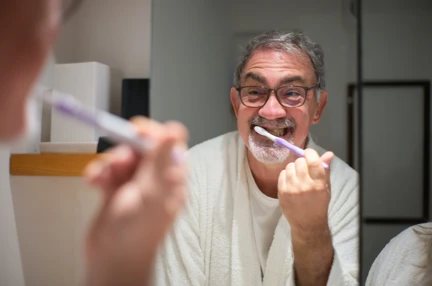Your eye care journey and what to expect
Being diagnosed with an eye condition can be worrying, particularly as it’s not always clear what happens next and where to go for support.
Working with our partners across the sight loss sector, we’ve put together the Eye Care Support Pathway to make your eye care journey easier.
This tells you what the key stages of eye care support are, and the kind of information you should be told at each stage in your journey.
How it can help you
The Eye Care Support Pathway identifies the key stages of eye care support and tells you what to expect at each stage. This means you can:
Be aware of what treatment you can expect, when it will happen and who you can talk to if you have any questions.
Have the information you need to understand your condition, how it might affect you and how to manage it.
Know how to get in touch with people and organisations, including Blind Veterans UK, that can help you manage your condition.
In England, local authorities have a legal obligation under the Care Act 2014 to help people with sight loss develop practical skills and strategies to maintain their independence.
The eye care support pathway
Stage 1: Your initial eye appointment
At Stage 1, you may want to ask:
- What tests you are likely to have and why you are having them
- What support you may need following your appointment and what the next steps are
- Where to get more information in the format you need
- How to access support while you wait for the next stage
- Whether you can choose the hospital or service you would like to go to if you need more test or treatment
- When to go back to the optometrist if you have any changes in your sight which you’re not sure about.
Who you will meet
- Optometrists, more commonly known as opticians, are trained to examine your vision, prescribe glasses or contact lenses and detect eye conditions. If necessary, they can refer you to other health professionals.
- Dispensing opticians are trained to fit and supply glasses, and some have additional training to fit contact lenses.
If you need to wait for further tests
If you have been referred for further tests while you are waiting for your appointment, you should be told:
- What to expect next and when
- How to get updated waiting times
- Who to contact if you have any questions
- How to get information and advice about the eye condition you may have
- How to access emotional support
- How long you might be waiting and how urgently you should be seen
- Who to contact if your eye conditions/symptoms change or get worse while you are waiting.
Stage 2: Having your diagnosis confirmed
At Stage 2, you should know:
- What condition you have and how it might develop
- How to access information about your condition and how it will be managed over time
- What your treatment options are
- That there may be no treatment available for your condition, what that might mean and what are the next steps
- That you can ask about genetic testing and how to access it if needed
- About research or any clinical trials which may be relevant
- How to access practical and emotional support and counselling.
Who you will meet
- Ophthalmologists are specialist doctors who diagnose, treat and monitor eye conditions.
- Orthoptists are qualified to identify and treat certain eye conditions such as squints or double vision.
- Ophthalmic Nurses provide nursing care and treatments to people with eye conditions and sight loss.
- Optometrists are also often part of the eye care team in hospitals.
- Eye Care Liaison Officers (ECLOs) are based in hospitals around the UK and can provide immediate support following a diagnosis. They can talk to you more about what happens next. Check before your appointment to see if your hospital has an ECLO.
Stage 3: Support after your diagnosis
At Stage 3, you should know:
- How your condition might develop
- How to follow your treatment plan if you have one and get support if you need it
- How to find out about research into your condition and how you can get involved if you want to
- What local support is available
- About any organisations which support people with your condition
- How to connect with people with the same condition or in a similar situation to you
- What the impact might be on your life eg. driving, work, hobbies, and where to get more information
- About the Certificate of Vision Impairment (CVI) and what it means
- About low vision services and how to access them
- About the registration process and what is available to you
- About how to access counselling or emotional support
- About the sight loss condition, Charles Bonnet syndrome (CBS), and how it might affect you.
- That you can contact your optician or eye clinic if you have changes in your sight between your appointments.
Who you will meet
- Ophthalmologists are specialist doctors who diagnose, treat and monitor eye conditions.
- Orthoptists are qualified to identify and treat certain eye conditions such as squints or double vision.
- Ophthalmic Nurses provide nursing care and treatments to people with eye conditions and sight loss.
- Optometrists are also often part of the eye care team in hospitals.
- Eye Care Liaison Officers (ECLOs) are based in hospitals
around the UK and can provide immediate support following
a diagnosis. They can talk to you more about what happens next. Check before your appointment to see if your hospital has an ECLO.
Stage 4: Living well with your condition
At Stage 4, you should know:
- What to expect from registration and what support is available from your Local Authority (Council)
- What vision rehabilitation is and how it can help you
- There may be a wait for vision rehabilitation and what you can access while you wait
- About support available locally and nationally
- About benefits which may be available to you
- What to do if your needs change
- That you can access further support at any time
- That with the right support you can live confidently and independently with your condition
- That you can always get in touch with your low vision service and ECLO for ongoing support with living with sight loss.
Who you will meet
- Vision Rehabilitation Specialists are qualified to support adults with sight loss to enable and empower them to lead independent and fulfilling lives
- Low Vision Specialists help people make the best use of their remaining vision.
Read our information guides
Getting registered as sight impaired
9 Oct 2023
An overview of the process of getting registered and the ways in which it can benefit you.
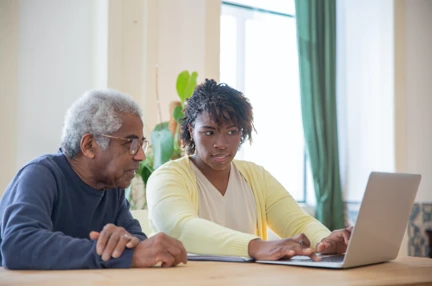
How different eye conditions can affect your sight
21 Aug 2023
Understanding the different parts of the eye and how they can affect your vision.
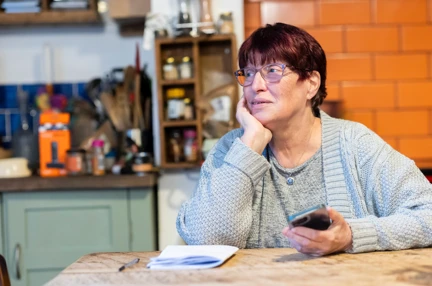
What to do if you notice a change in your sight
1 Oct 2023
The most important steps you should take if you think your vision has changed or deteriorated.
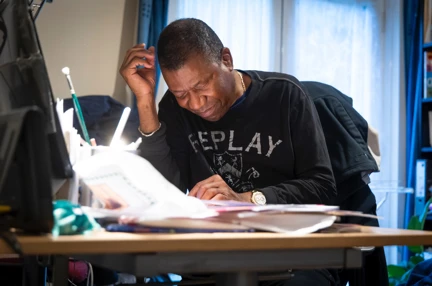
You should let the hospital know of any support needs you might have so that your appointment is appropriate for you.
Where to get support
Different eye conditions
For general FAQs, visit: Sight Advice FAQ
Some organisations offer general support to anyone with an eye condition or sight loss, and some are specific to certain conditions. You may find the following organisations helpful:
- The Macular Society
- Glaucoma UK
- Diabetes UK
- Stroke Association
- MS Society
- RNIB
- Retina UK - inherited sight loss
Ask your optician if they have patient leaflets or information available.
The registration process
To find out how to register as Sight Impaired (SI) or Severely Sight Impaired (SSI), read our guide, Getting registered as sight impaired
Clinical trials
The following organisations offer opportunities for taking part in clinical trials:
National Institute for Health and Care Research
fightforsight.org.uk/our-research
moorfields.nhs.uk/research/ research-opportunities-atmoorfields-roam
Local support
Email visionary@visionary.org.uk
rnib.org.uk/sightlinedirectory
Information about driving
gov.uk/driving-eyesight-rules
drivingmobility.org.uk macularsociety.org/support/
daily-life/practical-guides/outabout/driving
glaucoma.uk/care-support/ driving-with-glaucoma
Welfare benefits
Read our guide, Welfare benefits for people with sight loss
Support around education or employment
Thomas Pocklington Trust: 020 8995 0880
Support for specific needs/groups
If you are an ex-Serviceman or woman of any age, no matter how long you served for or how long ago, you can apply for our support at Blindveterans.org.uk
If you also have hearing loss, contact Sense
If you have a learning disability or autism, contact SeeAbility
If you are from a Black, Asian and Ethnic Minority community, contact BAME Vision
Counselling services
Read our guide, Counselling services for people with sight loss
Remember, you have a legal right to receive accessible information about your health and care and ask for information to be sent to you in your preferred choice such as larger print, audio or braille.
Read more about sight loss
Watching TV with a vision impairment
5 Jan 2024
Many of us rely on our televisions for entertainment – and having sight loss doesn’t need to mean missing out.
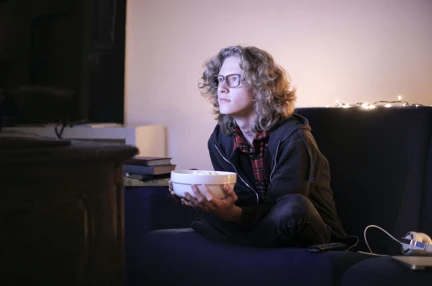
Sight loss aids for reading printed text
10 Dec 2023
Aids for people who are blind or partially sighted to help with reading letters, books and other printed materials.
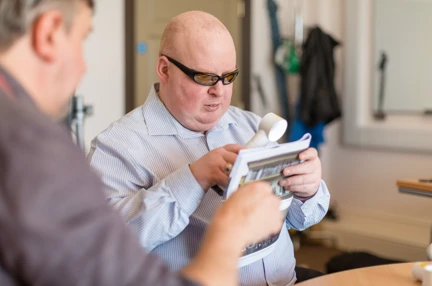
Getting ready for the day with low vision
7 Nov 2023
Tips and techniques to help blind and partially sighted people with washing, dressing and taking medication.
